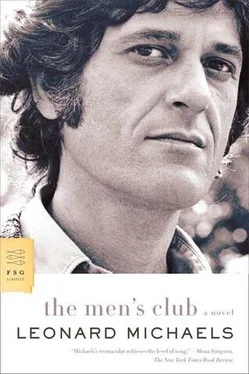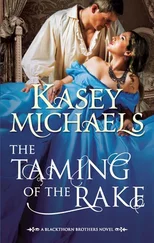Leonard Michaels - The Men's Club
Здесь есть возможность читать онлайн «Leonard Michaels - The Men's Club» весь текст электронной книги совершенно бесплатно (целиком полную версию без сокращений). В некоторых случаях можно слушать аудио, скачать через торрент в формате fb2 и присутствует краткое содержание. Год выпуска: 2008, Издательство: Farrar, Straus and Giroux, Жанр: Современная проза, на английском языке. Описание произведения, (предисловие) а так же отзывы посетителей доступны на портале библиотеки ЛибКат.
- Название:The Men's Club
- Автор:
- Издательство:Farrar, Straus and Giroux
- Жанр:
- Год:2008
- ISBN:нет данных
- Рейтинг книги:3 / 5. Голосов: 1
-
Избранное:Добавить в избранное
- Отзывы:
-
Ваша оценка:
- 60
- 1
- 2
- 3
- 4
- 5
The Men's Club: краткое содержание, описание и аннотация
Предлагаем к чтению аннотацию, описание, краткое содержание или предисловие (зависит от того, что написал сам автор книги «The Men's Club»). Если вы не нашли необходимую информацию о книге — напишите в комментариях, мы постараемся отыскать её.
is a scathing, pitying, absurdly dark and funny novel about manhood in the age of therapy. "The climax is fitting, horrific, and wonderfully droll" (
).
The Men's Club — читать онлайн бесплатно полную книгу (весь текст) целиком
Ниже представлен текст книги, разбитый по страницам. Система сохранения места последней прочитанной страницы, позволяет с удобством читать онлайн бесплатно книгу «The Men's Club», без необходимости каждый раз заново искать на чём Вы остановились. Поставьте закладку, и сможете в любой момент перейти на страницу, на которой закончили чтение.
Интервал:
Закладка:
Kramer rose from his pillow with a brooding face. “Men,” he said, “Terry is hungry. I believe him because I too am hungry. I suppose all of us could use a little bite. I would suggest we send out for pizza. Or I myself would make us an omelet. But not tonight. You are lucky tonight. Very lucky. Tomorrow, in this room, Nancy is having a meeting of her women’s group. So the refrigerator happens to be packed with good things. Let me itemize. In the refrigerator there is three different kinds of salad. There is big plates of chicken, turkey, and salmon. There is also a pecan pie. I love pecan pie. There is two pecan pies and there is two lemon pies. There is a chocolate cake which, even as I speak of it, sucks at me. I am offering all this to you, men. Wait, Berliner. I have one more thing to say, Berliner. In the alcove, behind the kitchen, rests a case of zinfandel. It is good, good California. Men, I offer to you this zinfandel.”
Berliner was already in the kitchen. The rest of us stayed to cheer Kramer. Even I cheered. Despite his tattooed arms, which reminded me of snakes, I cheered. His magnanimity was unqualified. No smallest doubt or reluctance troubled his voice. Every face in the room became like his, an animal touched by glee. We were “lucky,” said Kramer. Lucky, maybe, to be men. Life is unfair business. Whoever said otherwise? It is a billion bad shows, low blows, and number one has more fun. The preparations for the women’s group would feed our club. The idea of delicious food, taken this way, was thrilling. Had it been there for us, it would have been pleasant. But this was evil, like eating the other woman. We discovered Berliner on his knees before the refrigerator, door open, his head inside. We cheered again, crowding up behind him as he passed things out to us, first a long plate of salmon, the whole pink fish intact, then the chicken, then a salad bowl sealed with a plastic sheet through which we saw dazzling green life. It would be a major feast, a huge eating. To Cavanaugh, standing beside me, I said, “I thought you had to leave early.” He didn’t reply. He pulled his watch off, slipped it into his pocket, and shouted, “I see pate in there. I want that, too.” The cheers came again. Some of the men had already started on the salmon, snatching pieces of it with their fingers. Kramer, who had gone to the alcove, reappeared with black bottles of zinfandel, two under his arms, two in his hands. He stopped, contemplated the scene in his kitchen, and his dark eyes glowed. His voice was all pleasure. “This is a wonderful club. This is a wonderful club.”
TWO
Saint Augustine confesses to a night of vandalism with a gang of boys. They stole some pears. No big deal, but it troubled him that human company inspired evil. He hung out plenty. There was his mother, his mistress, his students, and always there were men. At Kramer’s table with a gang who’d stolen more than pears, I felt no evil, only a kind of exhilaration, though I remembered telling my wife I’d be home early and I worried a little about that. Why? Because I had no urge to leave. Neither did anyone else. Even Canterbury, the lean blond man who told no stories and hardly ever laughed, was still here. I worried then for no reason, only for the sake of form, maybe, as when you’re about to be unfaithful to your lover. How can I do this, you think, doing it. Paul and Berliner, to intensify the occasion, smoked marijuanas. The cigarettes quickened them grossly, putting nutty lights in their eyes. We’d eaten rapidly and very heavily, without much conversation, communicating in the action, in the food, deeper than words. Only Terry hadn’t yet finished eating. He’d started on a second slice of pecan pie, chewing steadily and studiously, as if caught up in the sheer momentum of his personal meal. Paul and Berliner smoked. The rest of us drank wine, Kramer’s good zinfandel. We’d emptied six bottles. Two more stood open on the table, beautiful things with long black necks and high curving shoulders. Watusi maidens.
Tomorrow, I supposed, my students would see me hung over, struggling with my voice. If one of them asked a question, I’d probably answer just the words and hope sense turned up on its own, like a lost dog. I didn’t care about tomorrow. I was feeling adventurous, the way I used to feel years ago when I’d meet my buddies after school and say, “Let’s shoot some eight ball.” We’d take off for a pool hall in downtown Manhattan, morbid theater of men and sharp sensations. No natural light. No street sounds. You’d hear the gritty crunch and squeak as the tip of a cue is chalked, and the racks smacking slate, sliding across felt. Men always leaning against walls and smoking cigarettes or shuffling about the tables, “seeing,” then calling, shots. I became one of them, cue stick gliding through the hook of my index finger toward a mottled bone-white moon ball. Then the measured stroke, soft thud, balls clacking, whirling apart, plopping into pockets. Always an ethical clock on the wall, but I didn’t know about time as I leaned over luminous green felt in the shadowy dusty air. When I lost a game, a hot screw started to turn in my chest, a ferocious need to play another game, redeem my place among the men regardless of the time.
Later my mother would say, “You’re ruining your life,” thus reminding me of that enormous other thing to do. It came to me vaguely now, that other thing — classes to prepare, books to read. The kitchen faucet needed a new washer. There were cracks in the stucco walls of my house. The privet hedge out front was too tall, too bushy, millions of leaves striking in every direction, threatening property values with life. I would go home soon, put in a new washer, seal cracks, trim hedge, resume the homeowner’s war against chaos. Right now I was at Kramer’s table with the men.
Terry sat opposite me. Small muscles rippled in his bald front. He chewed pecan pie, crushed the sticky nuts to pulp. To my left, Berliner sat hunched, heavy with deliberation, sipping his marijuana. Paul had rolled the cigarette, then passed it to him with a conspiratorial wink. They were simpatico. Drug brothers. To Paul’s left sat Harold Canterbury — lean, pale, static. He watched Paul twist a new paper around a pile of desiccated grass. To Canterbury’s left, at the end of the table, big Cavanaugh. Bottle of wine before him, neck enveloped in his hand. The sheen of eating made his cheeks look swollen and metallic, his head monumental, dominating silver, glass, ruined meats — chicken, salmon, various pâtés — and marijuana smoke winding above the devastation like an Oriental melody. Slow, pythonic weight. How I felt, beneath my exhilaration, having eaten too much. My body was a philosopher brooding on multitudes within as I gazed at a salad bowl just beyond my plate. Green shreds clung to the inner spin like leaves in a storm. Nobody spoke for several minutes and then Berliner said, after drawing marijuana essence into himself and savoring fine effects, “Good grass.” Paul nodded. These two, beyond the rest of us, were feeling things. Berliner nodded back at Paul, sealing their communion, his white hair rising about his head like brain gas, so startling I couldn’t imagine how he sold anyone a house. But of course the market was red-hot in California. A leper could sell a house. Kramer, at the end of the table opposite Cavanaugh, said, “Anyone care for coffee?” Nobody answered. There came only the sedulous crush of Terry’s face, still eating. In the hazel eyes an eating look. Alert and blind. I stared at him in a particular way. Square shoulders. Round head. He had great physical integrity. When he ate, he ate, and he was made of fundamental shapes; peasant blood. Durable laborious strength lay beneath his mauve silk shirt. It complicated him with elegance, a feminine flow against his bulk. He moaned when he swallowed, as if his pleasure were so serious it could be expressed as pain. As the pie went down, his eyelids lowered. He appeared to swoon, to suffer deliciously. Beside his head the hand holding the fork looked small. Thick stunted thumb. Not a clever thumb, but strong-willed, capable of gouging, strangling. I remembered him telling us he was a doctor. Though he was only eating pie, I could have watched him for hours. Perhaps anyone thrown together with anyone else is community. I wondered if we ever really have to talk. Full of food, I was full of an approving spirit. We make discriminations; we marry a pretty face, good brains, a sense of humor. All such discriminations seemed vicious now. Terry, about to raise another piece of pie to his mouth, stopped. Looking at the pie, he said, “There was a woman who liked to taste my food in restaurants. Deborah Zeller. I went out with her for months. I almost married her, but something happened.”
Читать дальшеИнтервал:
Закладка:
Похожие книги на «The Men's Club»
Представляем Вашему вниманию похожие книги на «The Men's Club» списком для выбора. Мы отобрали схожую по названию и смыслу литературу в надежде предоставить читателям больше вариантов отыскать новые, интересные, ещё непрочитанные произведения.
Обсуждение, отзывы о книге «The Men's Club» и просто собственные мнения читателей. Оставьте ваши комментарии, напишите, что Вы думаете о произведении, его смысле или главных героях. Укажите что конкретно понравилось, а что нет, и почему Вы так считаете.












